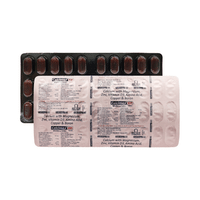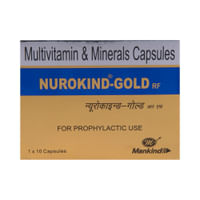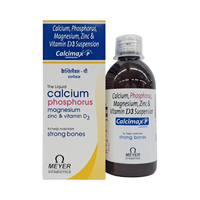Rs.238.96for 1 strip(s) (10 tablets each)
food interaction for Brentamin
alcohol interaction for Brentamin
pregnancy interaction for Brentamin
lactation interaction for Brentamin
food
alcohol
pregnancy
lactation
Brentamin Tablet 10s may be taken with or without food.
None
None
CAUTION
It is not known whether it is safe to consume alcohol with Brentamin Tablet 10s. Please consult your doctor.
CONSULT YOUR DOCTOR
The safety of Brentamin Tablet 10s during pregnancy has not been established. There are no adequate and well-controlled studies in pregnant women, and animal data on reproductive toxicity are insufficient. Your doctor will weigh the benefits and any potential risks before prescribing.
CONSULT YOUR DOCTOR
Information regarding the use of Brentamin Tablet 10s during breastfeeding is not available. Please consult your doctor.
CONSULT YOUR DOCTOR
SALT INFORMATION FOR Brentamin
Vitamin B2(200mg)
Uses
Vitamin B2 is used in the treatment of nutritional deficiencies.
How it works
Vitamin B2 provides essential nutrients.
Common side effects
Dark colored urine, Diarrhea
Magnesium(200mg)
Uses
Magnesium is used in the treatment of nutritional deficiencies.
How it works
Magnesium provides essential nutrients
Common side effects
Nausea, Acute toxicity, Watery diarrhoea, Flushing (sense of warmth in the face, ears, neck and trunk), Gastrointestinal discomfort, Decreased blood pressure, Rash, Upset stomach, Vomiting
Vitamin D3(2000IU)
Uses
Vitamin D3 is used in the treatment of Vitamin D deficiency and osteoporosis.
How it works
Vitamin D3 is a form of vitamin D. It raises vitamin D levels in your blood. This in turn raises calcium levels in your blood by helping you absorb more calcium from food.
Common side effects
Increased calcium in urine, Loss of appetite, Increased calcium level in blood, Itching, Rash, Urticaria, Facial swelling, Genital edema, Dry skin, Nail disorder, Erythematous rash, Decreased prothrombin level in blood, Difficulty in swallowing, Weakness, Fatigue, Sleepiness, Headache, Dryness in mouth, Metallic taste, Nausea, Vomiting
SUBSTITUTES FOR Brentamin
No substitutes foundExpert advice FOR Brentamin
- Taking vitamin B2 may result in dark yellow coloration of urine.
- Before taking this drug consult your doctor if you are pregnant or breast feeding.
- Get emergency medical help if you have any of these signs of an allergic reaction: hives; difficulty breathing; swelling of your face, lips, tongue, or throat.
Frequently asked questions FOR Brentamin
Vitamin B2
Q. Is Vitamin B2 the same as riboflavin?
Yes, Vitamin B2 is also called riboflavin. They are just different names of the same vitamin.
Q. Is Vitamin B2 good for you?
Yes, Vitamin B2 provides B2 which is good for the maintenance of our immune system, healthy hair, skin, nails and mucous membranes. It also helps in the prevention of eye conditions such as cataract, glaucoma and tired eyes (fatigue), and migraine headaches.
Q. Is Vitamin B2 and B12 same?
No, Vitamin B2 and B12 are not the same. However, they both belong to the same group of vitamins called group B vitamins. Vitamin B2 is also known as riboflavin and Vitamin B12 is also known as methylcobalamin.
Magnesium
Vitamin D3
Q. Is it better to take Vitamin D3 at night or in the morning?
You can take Vitamin D3 at any time of the day, morning, or night. However, there is limited information available about the best time to take Vitamin D3. Take it exactly as advised by your doctor.
Q. What are the benefits of taking Vitamin D3?
Vitamin D3 is important for maintaining bone health, support the health of the immune system, brain, and nervous system. It also regulates insulin levels and is also important for a healthy heart and blood vessels.
Q. How should Vitamin D3 be taken?
Vitamin D3 should be swallowed whole with water and should not be crushed or chewed. It is advised to take it with the main meal of the day to increase its absorption.























